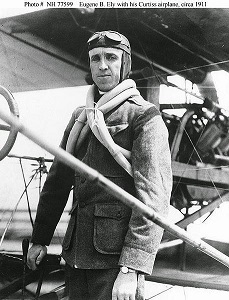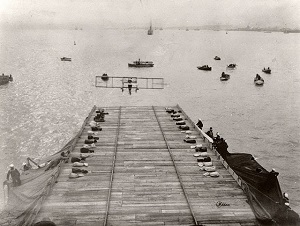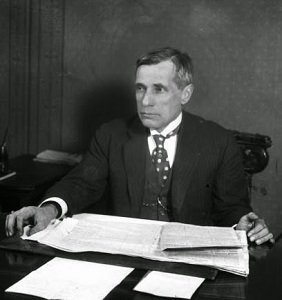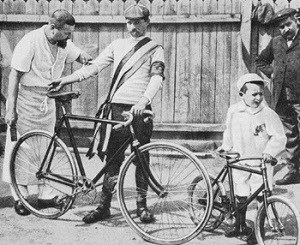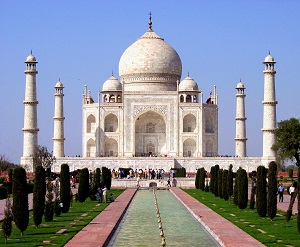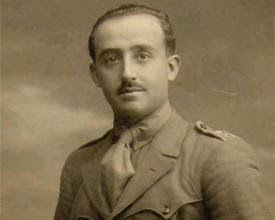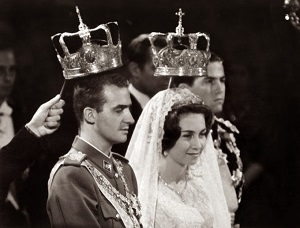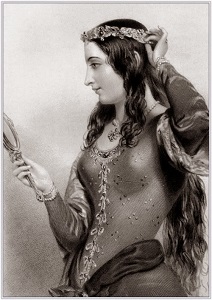The Sunday Section: This Week in History - Jan 18-24
January 18
1485 – The marriage of Henry VII to Elizabeth, Edward IV’s eldest daughter, unites the Houses of Lancaster and York.
1778 – Captain James Cook discovers a new group of islands in the Pacific Ocean on his third voyage of discovery aboard his ship, ‘Resolution’. The islands are called Hawaii in the local tongue, but Captain Cook, in claiming the territory for the Crown, has named them the Sandwich Islands.
1871 – Wilhelm, King of Prussia, is proclaimed the first German emperor.
King Wilhelm of Prussia
1911 – Eugene Ely lands his bi-plane on the US cruiser, ‘Pennsylvania’, in San Francisco Bay, becoming the first pilot to land his aircraft on a ship.
Eugene Ely; landing his Curtiss Model D biplane on the USS Pennsylvania (Smithsonian)
1919 – Following World War I, the Paris Peace Conference is convened by 27 nations; Germany is not allowed to attend.
1934 – The first arrest is made in Britain by policemen using pocket radios.
1943 – The 890-day siege of Leningrad has been broken by the Red Army, and land communications has been re-established. The city has been subjected to heavy air and artillery bombardment from German forces since September 1941, during which it only received irregular supplies, its inhabitants consuming everything remotely edible they could find.
Siege of Leningrad - queuing for water 1941
1991 – Demonstrators across the US protesting against the Gulf War clashed violently with police, resulting in 1,400 arrests.
19
1903 – A new race is to take place across France this summer, announced sports promoter and journalist, Henri Desgrange. Called the Tour de France, it will cover around 2,500-3,000 miles of roads and mountain passes throughout France and into parts of its five neighbours.
Henri Desgrange / Maurice Garin, winner of 1903 Tour de France
1915 – For the first time, Britain experiences a new form of destruction - aerial bombardment. German Zeppelin airships crossed the eastern English coast to bombard towns in East Anglia. Brilliantly lit, Great Yarmouth and King’s Lynn were hit, with more than 20 people killed. This could prove to be ominous for Britain, for the airships can patrol the North Sea at altitudes no British plane is able to reach.
Great Yarmouth after Zeppelin bombing 20 Jan 1915
1942 – The Japanese invade Burma.
1966 – Indira Gandhi becomes India’s first woman leader, following in the footsteps of her father, Jawaharlal Nehru, India’s first prime minister.
Indira Gandhi
1969 – 21-year-old student, Jan Palach, sets fire to himself in Wenceslaus Square in Prague as a protest against the Soviet invasion of Czechoslovakia.
“My act has fulfilled its purpose, but let nobody else do it.” ~ Jan Palach
1989 – Police used tear gas, water cannon and baton charges to break up demonstrators, led by dissident writer Vaclav Havel, commemorating the 20th anniversary of the death of Jan Palach who burned himself to death.
Jan Palach Memorial (panoramio)
20
1265 – England’s first parliament meets at Westminster, with the whole country represented in a single chamber. The parliament has been convened by King Henry III’s brother-in-law, the Earl of Leicester, Simon de Montfort. His military victory over the king at Lewes has left Henry with no choice but to acquiesce to the new parliament.
1841 – Hong Kong is ceded to Britain from China.
1878 – Cleopatra’s Needle, the 3,500-year-old obelisk, arrives in London from Alexandria in Egypt.
1882 – A draper’s shop in Newcastle-upon-Tyne becomes the first shop in the world to be lit by electricity.
1936 – Death of King George V. He reigned for 26 years, having come to the throne following the death of his elder brother, which required him to give up a career in the Royal Navy. He changed the name of the royal family from Saxe-Coburg-Gotha to Windsor during the Great War.
George V
1937 – Franklin Delano Roosevelt is back in office for a second presidential term.
1944 – The RAF drop 2,300 tons of bombs on Berlin.
1964 – The Great Train Robbers go on trial in Britain. (Interesting scrapbook of photographs taken by one of the investigating detectives)
(taken by Det Constable John Bailey)
1971 – The RAF Red Arrows collide in mid-air, killing four.
1981 – Ronald Reagan is inaugurated as President of the United States. Soon after, 52 American hostages are released in Iran.
1988 – Palestinians begin the intifada, or uprising, to protest against Israeli occupation of the West Bank.
1991 – Captured allied pilots – Americans, Britons, an Italian and a Kuwaiti – are paraded in front of the television cameras by their Iraqi captors.
21
1790 – Dr Joseph Guillotin demonstrates a new device in Paris, for performing executions. A heavy blade drops from a frame onto the neck of the victim.
1793 – Louis Capet, formerly King Louis XVI, found guilty of treason, is beheaded, the most famous victim yet of the guillotine.
Louis XVI ~ Antoine-Francois Callet
1846 – The first edition of the ‘Daily News’, edited by Charles Dickens, is published in London.
1879 – Zulus massacre British troops at Isandlwana in Natal.
1907 – Taxi cabs are officially recognised in Britain.
1911 – The first Monte Carlo car rally takes place.
1935 – Snowdonia, Wales, is designated a national park.
1924 – Death of Vladimir Ilyich Lenin, the Father of the Russian Revolution, aged 53. It was the death of his brother, hanged in 1887 after plotting against the Tsar, that brought about his political conversion.
Lenin
1950 – Death of George Orwell, aged 46.
George Orwell
1951 – Atomic bombs are tested in Nevada for the first time.
1976 – British and French Concordes make their inaugural commercial flights, from London to Bahrain, and Paris to Rio de Janeiro.
1981 – 52 American diplomats, held hostage in Iran for 444 days, land safely in Algiers.
22
1666 – Death of Shah Jahan, the once-mighty Mogul emperor, aged 74. He’d been imprisoned in his fort at Agra for 8 years by his son who had seized his throne. A direct descendant of Genghis Khan, he built the Taj Mahal as a mausoleum for his beloved wife, Mumtaz-i-Mahal, where he will be entombed beside her.
Mumtaz Mahal and Shah Jahan / Taj Mahal
1901 – Death of Queen Victoria, aged 81, having reigned for 64 years.
Queen Victoria's funeral procession (National Army Museum)
1905 – ‘Red Sunday’ massacre in St Petersburg. A mass march of about 1,000 demonstrators to the Winter Palace turned into slaughter when Cossack troops fired into the crowd at close range, killing at least 500. This could be the spark that ignites the discontent with the rule of Tsar Nicholas II, not least because the peaceful march was led by a St Petersburg priest, with marchers carrying crosses, icons and even the Tsar’s portrait.
(artist's impression of massacre)
1924 – Ramsay MacDonald becomes Britain’s first Labour Prime Minister.
Ramsay MacDonald
1941 – The British capture Tobruk from German forces.
1949 – Mao Tse-Tung, the Chinese leader, marched into Peking today with his ‘peasant’ army of battle-hardened guerrillas, making the Communists masters of China.
Mao Tse-Tung
1972 – The UK, Denmark and the Irish Republic join the EEC.
23
1556 – An earthquake in Shanxi Province, China, kills 830,000 people.
1571 – Queen Elizabeth I opens the Royal Exchange in London.
1713 – The Peace of Utrecht treaty is signed to end the 12 year long and bloody War of Spanish Succession. Its aim is to preserve the fragile power balance in Europe by preventing either Bourbon France or Habsburg Austria from dominating the old territories of the Spanish Succession.
1793 – Poland is partitioned by Russia, Austria and Prussia.
1806 – Death of William Pitt the Younger, aged 47. He was Britain’s prime minister twice, having first taken office at the age of 24.
William Pitt the Younger
1849 – Elizabeth Blackwell, born in Britain, qualifies in the USA as the first woman doctor. She was also the first woman on the UK Medical Register.
Elizabeth Blackwell
1931 – Death of Anna Pavlova, Russian prima ballerina, aged 45.
Anna Pavlova (c 1928)
1955 – General Franco reinstates the Spanish monarchy, and Prince Juan Carlos is allowed to claim the crown.
General Franco / Wedding of Prince Juan Carlos and Princess Sophia of Greece
1968 – North Korean patrol boats attack and capture a US Navy intelligence ship, the USS Pueblo, in the Sea of Japan, killing one crew member and taking the rest hostage.
1973 – President Richard Nixon tonight announced on television that the Vietnam War is over, stating that his government has achieved an agreement that will bring “peace with honour”.
1981 – Death of Salvador Dali, aged 78, despite having said, “Geniuses don’t die, I’m going to live forever.”
24
41AD - Roman emperor Caligula is murdered by a tribune of the guard.
Caligula
1236 – King Henry III marries Eleanor of Provence.
Henry III and Eleanor of Provence
1616 – Dutch navigator, Willem Schouten, today rounded the cape at the southern tip of the Americas. He has named the perilous cape, Cape Hoorn, after his birthplace in Holland.
1636 – American settlers have voted to adopt a new constitution called the Fundamental Orders of Connecticut. Believed to be the first such constitution in the colonies, it makes no mention of allegiance to the British Crown.
1848 – James Marshall makes a rich strike of gold at Sutter’s sawmill on the American River in California, which could lead to the greatest gold rush in the history of the United States.
1895 – Death of Lord Randolph Churchill, leader of the Conservative Party.
Lord Randolph Churchill
1916 – Conscription is introduced in Britain.
1961 – A US B-52 bomber breaks up in mid-aid, killing 3 crew and releasing 2, 24-megaton nuclear bombs.
B52 nuclear crash, Eureka, Goldsboro (RJHaas)
1965 – Death of Sir Winston Churchill, aged 90, exactly 70 years after his father, Lord Randolph.
1987 – Terry Waite, the special representative of the Archbishop of Canterbury, has been kidnapped in Beirut.


